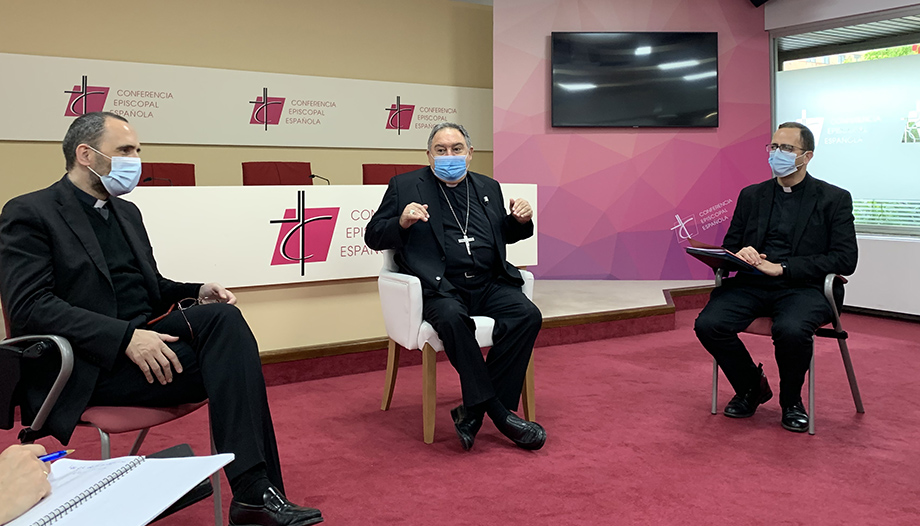During the meeting with journalists, held at the EEC headquarters, Bishop José Mazuelos dealt extensively with one of the key issues discussed in this briefing and which is being part of the business of the Plenary Assembly of the Spanish bishops: the recent approval of the euthanasia law in Spain.
A law that the President of the Episcopal Subcommission for the Family and the Defense of Life has described it as "inhuman", pointing out that "it is sad that, in a democratic state, citizens have to defend ourselves from the state itself and seek ways to defend ourselves".
One of these means of defense is the execution of a living will by persons who do not wish to be euthanized, as well as the right of conscientious objection by health professionals.
In relation to the living will, Bishop Mazuelos pointed out that his objective is that people "can freely refuse euthanasia before they lose consciousness or give the power to another person, in whom they trust, so that they are not eliminated when they become ill. This, together with a refusal of therapeutic incarceration. It is not a question of prolonging the agony but of promoting palliative sedation and palliative care.
"The euthanasia law is born of a wild neo-capitalist idea and will endanger the weakest."
Msgr. José Mazuelos. President of the Episcopal Subcommission for the Family and the Defense of Life.
Bishop Mazuelos stressed that the euthanasia law "will endanger so many people who are weak, lonely, demented...", it is a law that "will turn against the weak. We are seeing this in countries where it already exists", and he denounced the fact that politicians "talk about the law of dependency but the reality is that no money is allocated to it, the most vulnerable families find themselves alone and often unable to assume care". In this sense, he stressed the neo-capitalist base that underlies this law "the rich will be able to have palliative care, but what about the poor in our villages?
For the bishop of the Canary Islands, believers and all those opposed to this law "we have to open new channels to humanize medicine. To defend Hippocratic, humanistic medicine, a medicine of trust".
"You have to look at the elderly."
Along these lines, Mazuelos recalled the elderly: "The Pope has opened up the theme of the elderly in our society, with the celebration of the Day of Grandparents, for example. We need to look at the elderly. They have been locked up for a year, without seeing their families, their grandchildren. People who have not been out for months. Our society should pay tribute to grandparents, they are the great sufferers of the pandemic," he said.
Finally, Bishop Mazuelos referred to the need to move away from individualism in order to advance as a society: "The pandemic has shown that 'my life is my own' is a lie. If it is so, we take off our masks and let those who can save themselves be saved. We have a social dimension, we cannot live in what the Pope describes as the prison of materialistic individualism. We depend on others and we have to sacrifice part of our freedom for that".
"Christian marriage is the real revolution."
Bishop José Mazuelos also emphasized that the Spanish Church will work especially hard this year in the celebration of the Amoris Laetitia Yearproposed by Pope Francis.
Referring to this apostolic exhortation, Bishop Mazuelos emphasized that "Amoris Laetitia is a marvel. There are those who have wanted to distort it, with the theme of communion for divorced people... etc. But what Amoris Laetitia puts on the table is that the great revolution of our society is Christian marriage, as it was in the Roman Empire. Christian marriage is what we have to put in value".
Bishop José Mazuelos differentiated between traditional marriage and Christian marriage: "It is true that, many times, it has coincided, but the key to Christian marriage is that perfect fusion of eros and agape. There are traditional marriages that are not really Christian marriages".
"The Canary Islands cannot be a new Lampedusa".
The journalists also asked about other issues such as the approval of abortion for minors under 16 years of age without parental consent or the situation of migrants in the Canary Islands, a diocese he pastors. Regarding the first question, Bishop Mazuelos, as a physician, described the lowering of the age for abortion without parental consent as "madness, because minors depend on their parents and if something happens during the abortion, it is the parents who are in charge".
The situation of migrants in the Canary Islands was another of the questions to which Bishop Mazuelos responded. Pastoral Letter The bishops of the islands signed denouncing the situation of thousands of people arriving at the Canary coasts and who were in subhuman conditions. He also stressed that "this is a problem of the central government that has to assume and fix. The autonomous government of the Canary Islands is helping a lot; Caritas is overflowing: there are people sleeping in the street, the number of meals given per day has tripled. The Canary Islands cannot be a new Lampedusa. The Canary Islands is Spain, and whoever arrives in Spain is already free to transit throughout the state. It cannot be that they arrive to the islands, they are left there locked up and they 'forget' about the problem".












